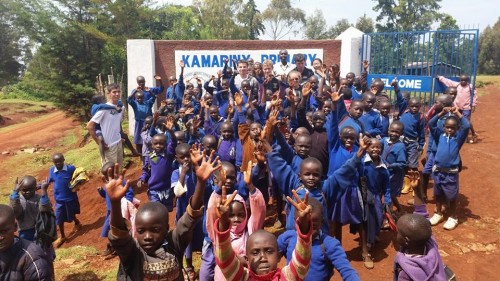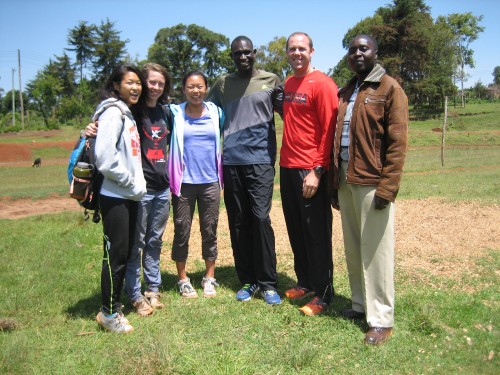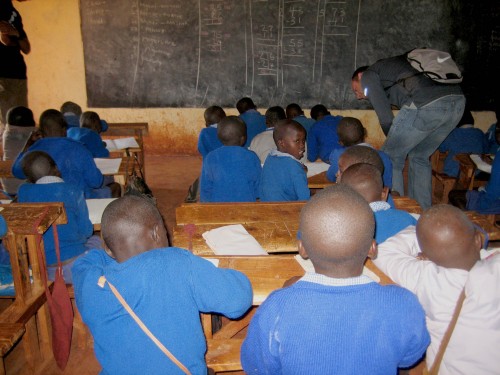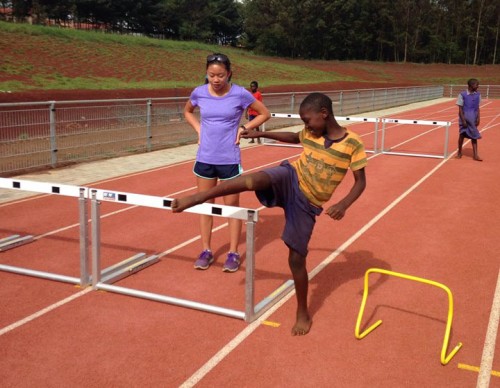Additional reporting by Trisha Kholiya

The alarm set for 5:45 a.m. went off, and junior Madeleine Yip and senior Julia Chang opened their eyes to the mosquito nets that hung over their beds in the High Altitude training center. Outside the windows, it was still pitch black, but the girls were still ready to slip into their training tights and windbreakers. It was summer in America, but on a different hemisphere, the girls recalled that they were greeted by the chilly morning air as they stepped outside the hotel. Jogging six miles around the facility track as their 7 a.m. ritual, they passed by other out-of-country track stars.
Yip and Chang were running in Iten, Kenya, as part of their volunteer and training program. Famed for its 8,000 foot elevation, Iten has become an increasingly popular location for runners to train in its acclaimed facilities. The high altitude is believed to be one of the secrets to how world-class Kenyan runners were able to make their name in the racing domain. According to the New York Times, almost a quarter of Iten’s 4,000 residents live by their feet; Running has found a way into the heart of Kenyans, not just as a sport, but as a way of life. From the professional trainers to the Kenyan children that run miles from their houses to school, the will of the Iten locals set precedent to Yip and Chang’s new outlook in this year’s cross country season.

In December of 2013, Chang stumbled across an ad for a service trip that would place her in Africa. STRIVE is an organization that gives groups of high school students a chance to train and serve in countries from South America to Africa. Yip heard the opportunity from Chang, and both agreed to commit to this trip.
As members of the MVHS cross country team, the relationship they forged as long-distance runners is comparable to sisters. Yip and Chang first met out of respect to each other’s dedication to running, and the duo followed each other in practice ever since. The trip provider Chang chose targeted Iten, Kenya, for its popularity as the leading running capital of the world. However, alongside the polished running centers, there existed a whole another face of poverty that never makes the flashy headlines. Anyone can hear about the plight of the African children, but only a few as Yip and Chang have delved into the kids’ lives, straight into the classrooms where they learn their daily lessons.

Chang and Yip got their first taste of Iten when they were driven on a truck around the dirt streets to their hotel. Shops, vendors and animals spread out over the dust trails in the town. In the more rural areas, there were stretches of farms and several sparse mud huts. It was not long before they shed their status as outsiders and felt the warm welcome of the Iten residents.
“If I walk on the road with my friends in Kenya, a bunch of people would just say hi to us, as if we’re their friends,” Yip said. “Here [in Cupertino], people would be more wary. It’s a lot more community-based in Iten.”
Then, they arrived at their destination. The High Altitude Training Center was designed for serious athletes, with straightforward rooms composed of only a bed, closet and bathroom. Unlike a regular American hotel, there was no TV, and the only way to access Internet was in a downstairs room. The rooms reflected the way Kenyan runners would train for races, by only focusing on their goal and nothing else.
Each day, after the girls finished their morning run near the hotel, they arrived at the Karminary Elementary school to volunteer. On the first day, Chang and Yip opened up the textbooks to teach the children mathematics and English, but they came to the realization that any of the teachers there can teach those materials. What the children lacked was knowledge in subject-verb agreement and an English-speaking friend. To help the kids improve their fluency in conversations, the girls put aside the books and sat down at the desks to learn about each child.

When Yip told them about America, about the computers in every room and the crowded suburban houses, the kids listened in awe. With a click on the Internet, anyone in America can search up a picture of Iten, but the children could not imagine anything other than the dirt roads and spacious fields they grew up in.
Every morning, grade-schoolers would wake up at 4 a.m. sharp to do chores around their simple two-bedroom houses. One room was for cooking, another for sleeping. The kids not only shared the living space with their parents and siblings, but goats, cows, cats and dogs. After finishing up their chores, kids ran to school at 9 a.m. in battered, donated shoes. Families owned no cars, so children relied solely on their feet as a way to run miles from home to school, then school to home for lunch. Their feet became hard and calloused over time, weathered by the sand and dust. Yet the kids arrived at school each day with a wide smile, ready for a new lesson.
“[The children] see learning as something more special,” Yip said. “Nothing is given to them. That’s why they appreciate learning more.”
During the break time, Yip and Chang sat down on the sides to watch the kids play. Running and bouncing, boys and girls rushed over to them to coax them out of their seats. Following the children’s instructions, the girls joined in on the kids’ version of dodgeball and Chinese jump rope. On the side, other children play hand games, kicked around soccer balls made from trash bags and performed dangerous flips.
Aspiring to be as hard working as the children, Yip vowed to complain less during the cross country season. Yip learned about the work ethic of Kenyan runners through reading, and gained perspective on what it means to “run like your life depends on it.” Kenyan runners train to gain enough recognition to run in world-wide events, so they can win prize money to build a proper house back in their home country.
“[At cross country practice,] before a workout, we just groan, and are like ‘I don’t want to do this,’” Yip said. “Kenyan runners just take it. I should do that, too.”
For Chang, the trip was more for gaining a global perspective. She enjoyed traveling to a new country and trying many traditional Kenyan foods, such as ugali, a doughy dish made of steamed maize flour, and chapati, a soft flatbread.
“Be really open-minded, and don’t be afraid to try new things,” Chang said. “If someone asks you to try their food, or one of their activities, just do it. You’re never going to be able to do it again once you come back.”
After three weeks, the two girls flew back to Cupertino. On their last day in Kenya, the school held a farewell ceremony where everyone came together to hug and bid their farewells. Hot tears flowed down Chang’s cheeks when she said her goodbyes as the school children laughed at her show of emotion and the acknowledging teachers stood on the side. It is likely the girls will never meet the children again, but Yip and Chang will never part with their memories of their three weeks across the globe.
“Teaching [at] the elementary school kids helped me form the connection with them,” Yip said. “They were like my little brothers and sisters.”





